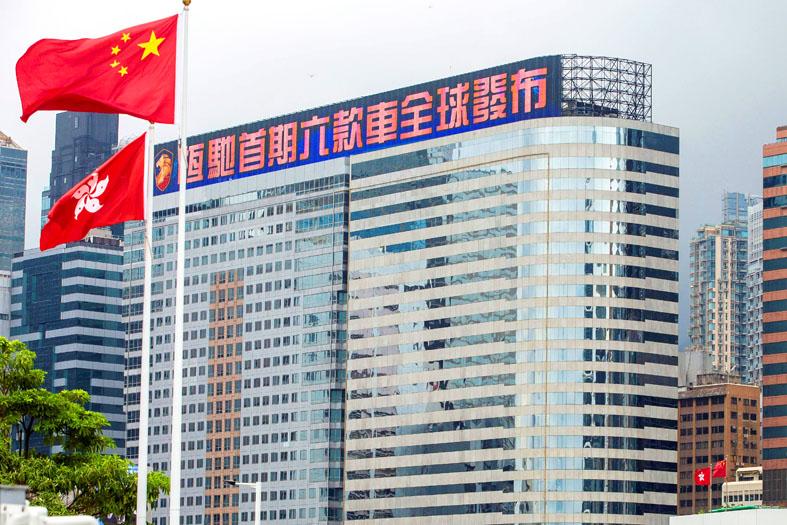China Evergrande Group (恆大) bonds dropped toward record lows, with S&P Global Ratings warning of a potential “downward spiral” as creditors lose confidence in the world’s most indebted developer.
“Evergrande’s liquidity position is eroding more quickly and by more than we previously expected,” S&P analysts led by Matthew Chow wrote in a report late on Thursday in Hong Kong. “The company’s nonpayment risk is escalating, not only for the substantial public bond maturities in 2022, but also for its bank and trust loans and other debt liabilities over the next 12 months.”
The credit rating firm cut Evergrande by two levels to “CCC,” just four notches above the designation for defaulted borrowers. It is the second downgrade by S&P in less than two weeks and follows similar moves by Fitch Ratings and Moody’s Investors Service. Evergrande did not immediately respond to a request for comment.

Photo: AFP
S&P said that disputes over contract payments are rising as contractors claim that Evergrande has delayed payments.
These contractors are applying for asset freezes as they aim to resolve disputes in court, contributing to negative media reports and lenders’ risk adjustments, S&P said.
“The steadily increasing number of asset freezes signals strained liquidity,” S&P said. “Evergrande’s access to funding from financial institutions is more significantly constrained than expected. As news reports continue to be negative, the company could experience a considerable ‘downward spiral,’ with lenders potentially further tightening their risk exposure to the company,” it said.
The disputes and tightened liquidity come as huge liabilities loom. S&P estimates the developer has more than 240 billion yuan (US$37 billion) of bills and trade payables to settle over the next 12 months, of which about 100 billion yuan is due this year.
Evergrande, which has been making its dollar-bond payments on time, is ramping up asset sales to pay down debt, raising more than US$8 billion so far this year. The company’s shares and bonds rose earlier this week after it announced a stake sale in its Internet unit for US$418 million.
Evergrande’s dollar bonds began dropping anew on Thursday after an unverified rumor that creditor claims against the company would be centralized in a Guangzhou court.
The rumor, which appeared in a now-deleted WeChat post, sent the developer’s offshore notes down about US$0.05 to below US$0.42 , credit traders said. The stock was little changed in Hong Kong, but has plunged 63 percent this year.
“Evergrande is just moving into a vicious cycle,” said Eddie Chia, portfolio manager at China Life Franklin. “It is suffering from negative feedback loop of negative news.”

Hong Kong authorities ramped up sales of the local dollar as the greenback’s slide threatened the foreign-exchange peg. The Hong Kong Monetary Authority (HKMA) sold a record HK$60.5 billion (US$7.8 billion) of the city’s currency, according to an alert sent on its Bloomberg page yesterday in Asia, after it tested the upper end of its trading band. That added to the HK$56.1 billion of sales versus the greenback since Friday. The rapid intervention signals efforts from the city’s authorities to limit the local currency’s moves within its HK$7.75 to HK$7.85 per US dollar trading band. Heavy sales of the local dollar by

To many, Tatu City on the outskirts of Nairobi looks like a success. The first city entirely built by a private company to be operational in east Africa, with about 25,000 people living and working there, it accounts for about two-thirds of all foreign investment in Kenya. Its low-tax status has attracted more than 100 businesses including Heineken, coffee brand Dormans, and the biggest call-center and cold-chain transport firms in the region. However, to some local politicians, Tatu City has looked more like a target for extortion. A parade of governors have demanded land worth millions of dollars in exchange

Taiwan Semiconductor Manufacturing Co’s (TSMC, 台積電) revenue jumped 48 percent last month, underscoring how electronics firms scrambled to acquire essential components before global tariffs took effect. The main chipmaker for Apple Inc and Nvidia Corp reported monthly sales of NT$349.6 billion (US$11.6 billion). That compares with the average analysts’ estimate for a 38 percent rise in second-quarter revenue. US President Donald Trump’s trade war is prompting economists to retool GDP forecasts worldwide, casting doubt over the outlook for everything from iPhone demand to computing and datacenter construction. However, TSMC — a barometer for global tech spending given its central role in the

The Financial Supervisory Commission (FSC) yesterday met with some of the nation’s largest insurance companies as a skyrocketing New Taiwan dollar piles pressure on their hundreds of billions of dollars in US bond investments. The commission has asked some life insurance firms, among the biggest Asian holders of US debt, to discuss how the rapidly strengthening NT dollar has impacted their operations, people familiar with the matter said. The meeting took place as the NT dollar jumped as much as 5 percent yesterday, its biggest intraday gain in more than three decades. The local currency surged as exporters rushed to